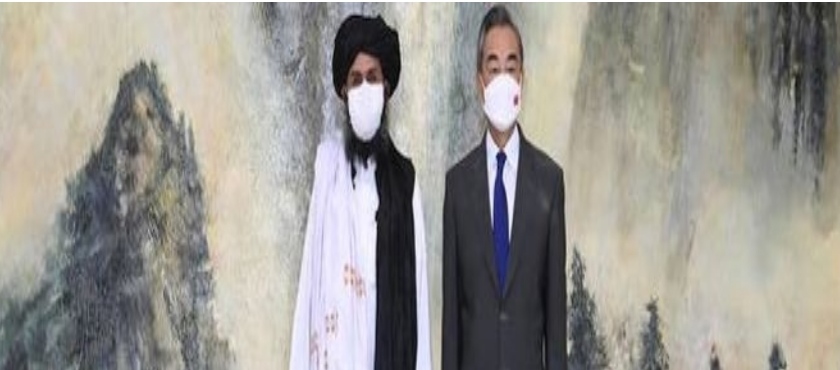China Hosts Taliban, Calls Them ‘PIVOTAL FORCE’ In Afghanistan

Taliban co-founder Mullah Abdul Ghani Baradar, left, and Chinese Foreign Minister Wang Yi pose for a photo during their meeting in Tianjin, China, on Wednesday, July 28, 2021
The visit to China is the first from the group in the wake of its gaining key ground in Afghanistan, including in Badakshan province which borders China’s western Xinjiang region.
China on Wednesday hosted a rare nine-member Taliban delegation amid its recent ascendancy in Afghanistan, with Foreign Minister Wang Yi describing the group as “a pivotal military and political force” in the country.
The delegation, led by Abdul Ghani Baradar who heads the Taliban’s political office in Doha, met with Chinese Foreign Minister Wang Yi and other officials in Tianjin, a port city around 100 km southeast of Beijing.
The visit to China is the first from the group in the wake of its gaining key ground in Afghanistan, including in Badakshan province which borders China’s western Xinjiang region.
It isn’t, however, the first such Taliban visit to China and caps years of careful outreach from Beijing to the group, on occasion mediated by Pakistan, China’s “all-weather” ally. A delegation was hosted in Beijing in 2019, while in 2015, China had hosted negotiations between the Taliban and Afghan officials in the city of Urumqi, Xinjiang’s provincial capital, in a meeting facilitated by Pakistan.
The Taliban delegation’s visit also comes days after Pakistan Foreign Minister Shah Mahmood Qureshi met with Mr. Wang in the Chinese city of Chengdu. Both sides on Saturday said they had agreed on “joint actions” to more closely work together in Afghanistan amid the changing situation in the country.
The Chinese Foreign Ministry in a statement on Wednesday said Mr. Wang had called on the Taliban “to draw a line” between the group and terror organisations, specifically the East Turkestan Islamic Movement (ETIM) which has carried out attacks in Xinjiang.
He described the Taliban as “a pivotal military and political force in Afghanistan” and said it was “expected to play an important role in the process of peace, reconciliation and reconstruction”. He said China hoped the group would “resolutely and effectively combat” the ETIM.
Mr. Wang also hit out at the U.S., telling the delegation that “the hasty withdrawal of U.S. and NATO troops from Afghanistan marks the failure of the U.S. policy toward Afghanistan”.
The head of the Taliban delegation, the Chinese Foreign Ministry statement said, committed that the group “will not allow any force to use Afghan territory to do anything harmful to China.” He was also quoted as saying the Taliban “hoped China will participate more in the peace and reconstruction process and play a greater role in the future reconstruction and economic development of Afghanistan.”




